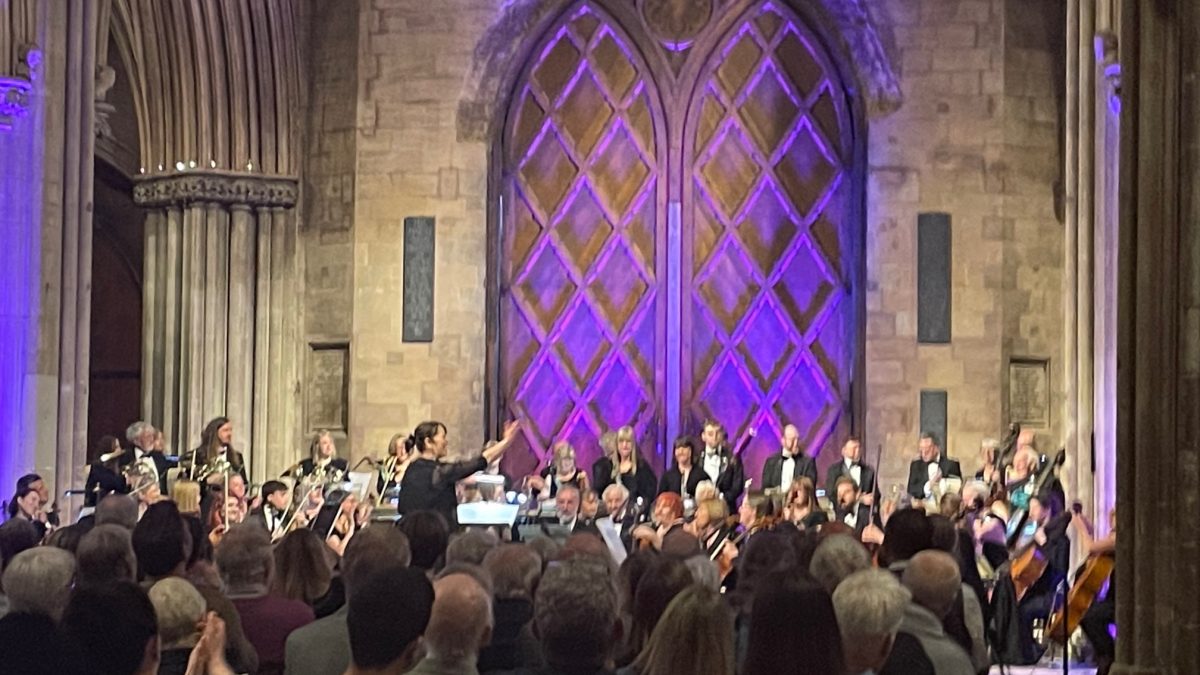Lichfield Sinfonia: Grieg, Greville and Gaudeamus!
Lichfield Sinfonia Spring Concert
Lichfield Cathedral
Saturday 20 May 2023
By Jono Oates
At the age of 12, as an under-performing scholar at Bishop Vesey’s Grammar School in Sutton Coldfield, I can remember hearing the song ‘Gaudeamus Igutur’ – whether I sang it as part of the school choir, or whether it was sung by other pupils or teachers I cannot recall, but it must have had an everlasting impact on me as that same musical refrain echoed around the nave of Lichfield Cathedral at the Lichfield Sinfonia concert on Saturday evening and I recognised it instantly. The tune is incorporated into the Academic Festival Overture Opus 80 by Johannes Brahms and as its familiar melody was played by the orchestra, I could not resist mouthing ‘Gaudeamus Igutur, Juvenus Dum Sumus under my breath. My Latin was so poor at school (the board-rubber was often twirled in my direction by my teacher in absolute despair at my inability to remember even the most basic of phrases…) that I never had a clue what I was singing, or what it meant, other than the fact that it sounded rather grand. With the benefit of good old Google (where were you when I needed you most Mr Google!!) I was able to discover that the lyrics go back to the 13th century and the music to the 18th century and that the lyrics are effectively a celebration of the scholarly social life (I don’t remember much of that!) and the fact that death catches up with all of us. Brahms wove Gaudeamus in to his Festival Overture in 1880, one of two overtures he composed as a tribute to the University of Breslau who had provided him with an honorary doctorate.
My old school friend Gaudeamus provided the perfect opening to the Spring Concert by the Sinfonia orchestra, setting the scene for two hours of stirring, engaging and entertaining classical music form some of the greatest composers of the last two hundred years, as well as a composition from a modern-day Lichfeldian.
Brahms’ Academic Overture was followed by Edvard Grieg’s Piano Concerto in A Minor, Opus 16. Performed by classical pianist Victor Lim, this was definitely one of the highlights of the concert, simply glorious. The opening movement begins with an instantaneous, and dramatic, outpouring of chords that immediately creates an impact and an expectation. As someone who cannot play the spoons, let alone any kind of musical instrument, I am always in awe at the speed, and dexterity, of the hand-speed of this quality of pianists, it is just a pleasure to listen to the music all around you, especially in the wonderful setting of the cathedral. A first-class performance by Victor, which earned him a very well-deserved ovation, and encore, at the close. Edvard’s concerto did, of course, achieve even greater fame by being one of the stars of the Morecambe and Wise Christmas Show in 1971, with the star concert pianist that evening being the inimitable Eric Morecambe and the unfortunate conductor, Andre Previn. This did mean that a gentleman sitting directly behind me turning to his friends at the interval that directly followed, repeating the most quoted line in British TV comedy: ‘I played all the right notes…but not necessarily in the right order…’.
After the interval the next composer was Joanne Dodds, leader of the Sinfonia, who had created a new composition, The Three Spires Suite, celebrating the history and heritage of Lichfield. The first movement was Besieged Lichfield, musically illustrating the three sieges of Lichfield Cathedral during the English Civil War, 1643-1646. The piece featured the brass section portraying the sound of battle, and the strings the marching feet of the soldiers bearing down on the cathedral. A single ‘shot’ rang out to indicate the sound of Royalist John ‘Dumb’ Dyott’s lead shot as it winged its way over Minster Pool to strike, and kill, Roundhead General Lord Greville Brooke dead – one of Lichfield’s most famous, and grisly, incidents.
The following movements featured Lichfield’s most famous son, Dr Samuel Johnson, Erasmus Darwin, grandfather of Charles, including reference to the Lichfield Bower and the Lichfield Festival, and finally The Chase Rondo, telling the story of Cannock Chase and them merging in to another grisly Lichfield event the burning to death of Edward Wightman, tied to a stake on the Market Square in April 1612, becoming the last man in the country to be burned to death for the act of heresy.
This home-produced composition from Joanne, who performs in her own right as CAVE, demonstrated the rich, colourful and sometimes violent aspect of Lichfield’s history, very clever and a composition that can rightly claim to be 100% Lichfeldian!
The concert closed with there more very well-known compositions: Adagio from the ballet Spartacus by Arum Khachaturian; Nocturne and the classic Wedding March from Felix Mendelssohn’s A Midsummer Night’s Dream, and Jean Sibelius’s Karelia Suite, Opus 11, the Intermezzo and the closing Alla Marcia, was a wonderful and very fitting performance to close the concert.
Conducted by Sarah Birchall this was an excellent evening’s entertainment, it the first time I had been to one of their concerts, but it will certainly not be the last! Their Summer concert, featuring music form stage and screen and some ‘light’ classical is on Sunday 2 July 2023, and you can find details of that, and all their other performances on their website at:




